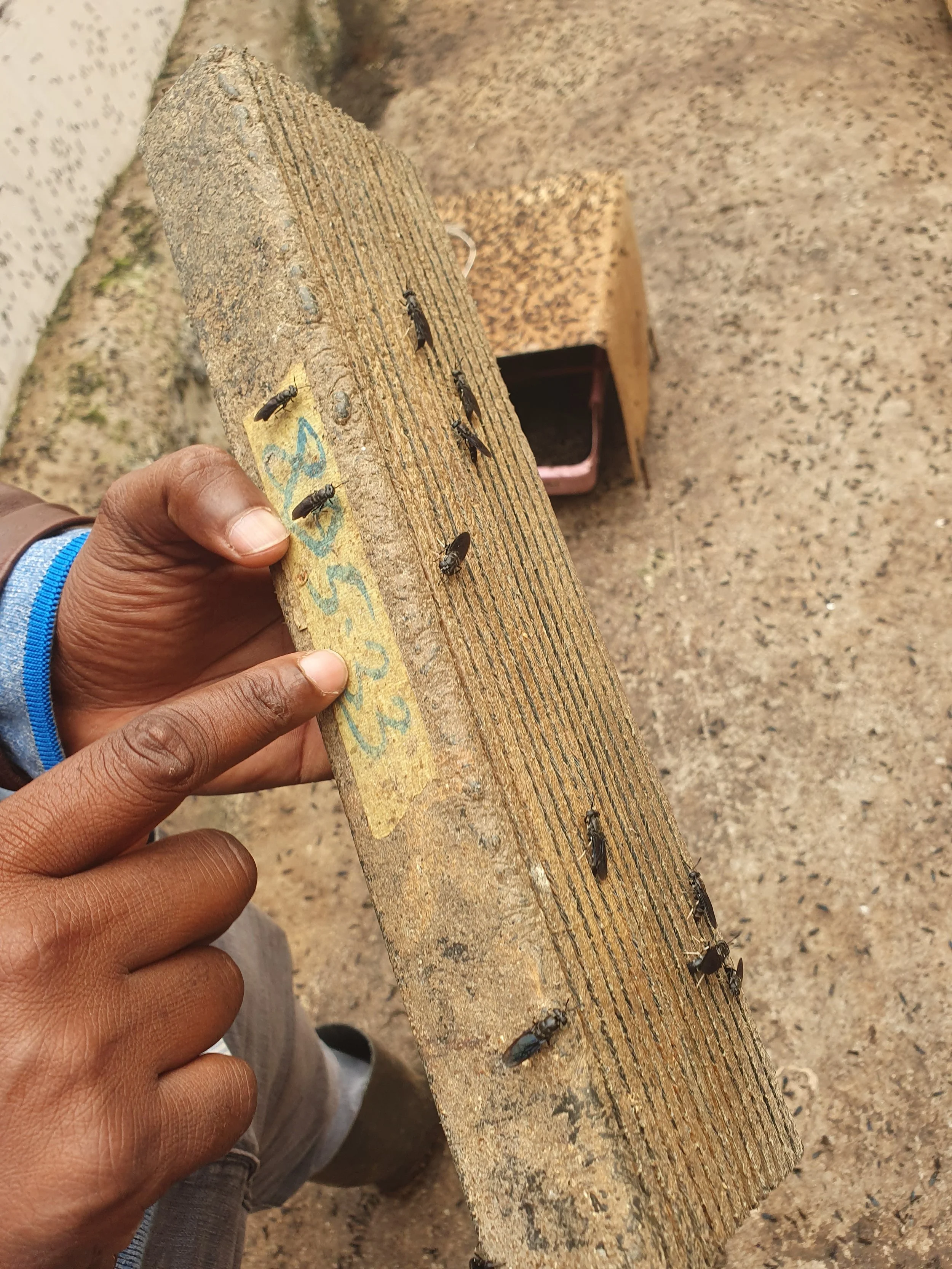Black Soldier Fly Farming in East Africa
After travelling around The Americas and Europe on my Nuffield Farming Scholarship, I found myself feeling pessimistic about the black soldier fly (BSF) industry. It seemed everyone wanted to be the next big insect-tech superstar, but few were willing to roll up their sleeves and get their hands dirty with actual insect rearing - you could say it's all buzz and no bite! Those who are working hard in the industry are providing inputs such as eggs, technology or research, and often charging you for it too. It isn't exactly the ideal set-up for the projected 2030 multi-billion dollar industry.
Armed with newfound knowledge about the infrastructure required for successful BSF farming (check out my Cape Town blog for the nitty-gritty details), I set my sights on East Africa. Could this be the promised land of practical, cost-effective insect production? How is regulation helping (or, hindering) producers? And, how does the funding infrastructure work?
Setting the Scene: My East African Odyssey
With my eyes wide open and twitching with curiosity, I embarked on a journey through Rwanda, Kenya, and Tanzania. From the shores of Lake Kivu to the shadow of Mount Kilimanjaro, I met passionate entrepreneurs, innovative farmers, and forward-thinking researchers. My mission? To separate the larvae from the frass and uncover the secrets of successful BSF farming in East Africa.
Along the way, I had the privilege of visiting an eclectic mix of BSF operations. In Rwanda, I dropped by fish and coffee farms with strong collaborations with BSF farming. Kenya proved to be a hive of activity, with stops at established players like InsectiPro and Sanergy, as well as corporate farming operations looking to diversify. And in Tanzania, I got a glimpse of a different approach with Chanzi, a company so focused on low-cost production, they make penny-pinchers look like big spenders!
It's time to explore the world of East African BSF farming and discover if they've truly found the secret sauce (or should I say, secret larvae?) to making this industry fly!
Key Learnings: The African Advantage
1. Embracing the Low-Cost Model
One of the most striking observations from my travels was the emphasis on low-cost production models. Companies like Chanzi in Tanzania have taken this approach to heart, scrutinizing every expense and finding innovative ways to reduce costs. They're so cost-conscious, I wouldn't be surprised if they started charging the flies rent! From eliminating trays to locating facilities next to waste processing plants, these businesses are proving that BSF farming can be both profitable and impactful in the African context.
What I've learnt from this is the difference of how things happen in East Africa. In Europe, we have an idea and fund its inception with a grant, build our infrastructure, then sell. In Africa, where funds are limited, the approach is build and sell together, until you have the operation to apply for funds to expand, all the while selling as you go. Shouldn't this be the norm for business? Have we got too reliant on nice grants and investments in Europe and the west?
2. Leveraging Local Conditions
East Africa's climate provides a natural advantage for BSF farming. The warm, humid conditions are ideal for fly breeding and larval growth, reducing or eliminating the need for energy-intensive environmental controls. This was particularly evident at Sanergy's breeding operation on the Kenyan coast, where they're able to produce eggs for worldwide distribution at highly competitive prices. This is a recent pivot from their high-altitude Nairobi location to access ideal breeding conditions on the coast.
3. Addressing Waste Management and Food Security Simultaneously
Many of the BSF operations I visited are tackling two of East Africa's most pressing challenges: waste management and food security. Talk about killing two flies with one swatter! By converting organic waste into high-quality protein and fertilizer, these businesses are creating a circular economy model that benefits both the environment and local agriculture. Insectipro, Sanergy and Chanzi's use of post-consumer food waste as feedstock is a prime example of this dual-purpose approach.
From what I saw, there is limited opportunity to using pre-consumer food waste, as much of it has been utilised already, with the exception of corporate farms exporting to outside of Africa. With my commercial experience at Tesco, Kenya is one of the few places in Africa that produces for export, so I would guess that these options are very limited in all of Africa and post-consumer waste would be the preferred option.
4. Innovative Applications Beyond Animal Feed
While much of the focus in BSF farming is on producing protein for animal feed, I encountered several innovative applications that go beyond this traditional use. Loop's premium pet food line showcases the marketing potential of insect-based products. Meanwhile, Proteen's focus on producing enhanced compost for coffee growers demonstrates the versatility of BSF frass as a value-added fertilizer. It's a super simple model, that create-s a win for the producer, win for the coffee distributor and a win for their business as they grow their business on licenses rather than product sales, which can be volatile. Who knew that fly poop could be liquid gold for your morning brew?
5. The Importance of Adaptability
Perhaps the most valuable lesson from my travels was the importance of adaptability in the BSF industry. As mentioned above, companies like Proteen, which has pivoted its business model multiple times, exemplify the flexibility required to succeed in this emerging field. The ability to recognize when to persevere and when to pivot is crucial for long-term success.
BSF in the UK: Lessons and Opportunities
As I return to the UK, I'm filled with ideas and insights that I believe can benefit our nascent BSF industry. While we can't directly replicate the low-cost models of East Africa due to differences in labour costs, environmental conditions and regulations, there are several key takeaways we can apply:
Focus on Demand: Rather than competing on cost alone, UK BSF producers should leverage the growing demand for sustainable protein sources and circular economy solutions. This is our European advantage.
Explore Niche Markets: The success of companies like Loop in the premium pet food market suggests there's potential for specialised, high-value BSF products in the UK.
Emphasize Circular Economy Benefits: The waste management applications of BSF farming could be particularly appealing in the UK, where there's growing pressure to reduce landfill usage and increase recycling rates.
Collaborate Across Industries: The symbiotic relationships I observed between BSF farms and other agricultural sectors (like coffee and fish farming) highlight the potential for cross-industry partnerships in the UK.
Invest in Research and Development: The innovative approaches to BSF farming I encountered in East Africa underscore the importance of ongoing R&D to adapt the technology to local conditions and regulations.
I entered Africa pessimistic to the future of our industry. However, I leave with ideas, inspiration, possible future collaborations and a sense of vigour for what needs to happen to transform the industry. The ingenuity and determination I witnessed in East Africa has inspired me to push for greater adoption and innovation in the UK's BSF industry. By combining the lessons learned abroad with our own strengths and resources, we have the opportunity to develop a thriving, sustainable BSF sector that contributes to both our agricultural and environmental goals.
The question is no longer "Can we farm black soldier flies?" but rather "How can we farm them most effectively?" East Africa has provided some compelling answers, and it's now up to us to adapt and apply these insights in our own context. This is what I plan to do over the coming weeks - I shall document this in my next blog post, where I hope to share my findings from the past months of travel.







